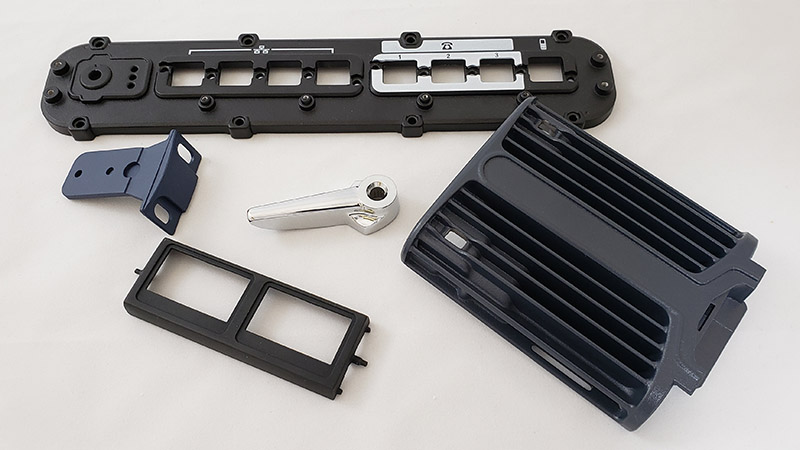The role of an Aluminum Casting Company in industrial production processes
Wiki Article
Finest Practices for Maintenance and Applications in the Light Weight Aluminum Shop Market: An In-depth Review
Preserving equipment in the light weight aluminum shop field is vital for operational success. Routine evaluations and predictive maintenance can substantially lower downtime and improve security. Advanced innovations, such as IoT and data analytics, play a crucial role in this process. Nonetheless, comprehending the full range of ideal methods needs a more detailed assessment of specific strategies and their effects on performance. What are the important components that add to a reliable maintenance framework?Importance of Regular Maintenance in Aluminum Foundries
Routine upkeep plays an important duty in the reliable operation of aluminum factories. By methodically evaluating and servicing tools, shops ensure peak efficiency and durability of equipment. Normal upkeep tasks, such as cleansing, component, and lubrication substitute, assistance avoid unexpected failures that can bring about pricey downtime.Moreover, regular checks enhance work environment safety and security by determining prospective risks before they intensify right into serious issues. Equipment that is well-maintained operates a lot more efficiently, causing boosted product high quality and decreased waste. In addition, adherence to an organized maintenance schedule can sustain compliance with industry regulations, thereby promoting a reputation for dependability and quality within the market.
Executing Anticipating Upkeep Strategies
Predictive maintenance techniques take the concepts of routine maintenance an action additionally by leveraging data analytics and advanced monitoring modern technologies. In aluminum shops, these strategies make it possible for drivers to expect devices failures before they take place, thereby minimizing unexpected downtimes and maximizing operational effectiveness. By using sensing units and IoT devices, real-time information can be accumulated on device efficiency, enabling the recognition of possible issues via predictive analytics.Enhancing Melting and Putting Procedures
Effective melting and putting processes are essential for making the most of efficiency and guaranteeing the high quality of aluminum castings. To enhance these processes, factories ought to concentrate on precise temperature level control during melting, as this directly affects the metallurgical residential properties of the alloy. Making use of advanced melting technologies, such as induction and resistance melting, can enhance energy efficiency and lower cycle times.Carrying out automated pouring systems lessens human error and preserves consistency in the putting procedure. Proper mold preparation, including adequate preheating, is important to stop thermal shock and boost mold durability.

Enhancing Safety And Security Procedures in Factory Workflow
Prioritizing safety in light weight aluminum shop operations is vital for shielding employees and assuring a productive atmosphere. Efficient safety protocols consist of normal training sessions that stress the relevance of personal safety tools (PPE), such as goggles, headgears, and gloves. In addition, the establishment of clear emergency treatments is crucial in handling prospective mishaps.Routine evaluations of equipment and equipment assistance determine risks before they intensify into severe problems. Carrying out a robust reporting system encourages workers to connect safety concerns without fear of effect. Fostering a society of safety and security guarantees that every worker recognizes their role in preserving a protected work environment.
Furthermore, guaranteeing correct ventilation and surveillance air high quality can reduce exposure to unsafe fumes and dust. By strengthening these practices, light weight aluminum factories can significantly minimize the threat of crashes and create an atmosphere where staff members really feel valued and secure, ultimately enhancing overall operational effectiveness.
Leveraging Modern Technology for Improved Efficiency
Utilizing sophisticated technology has actually come to be significantly crucial for aluminum foundries aiming to improve functional performance. Automation and robotics play a vital role in streamlining production procedures, decreasing labor prices, and reducing human mistake. Executing real-time surveillance systems permits for the constant analysis of devices performance, enabling proactive maintenance and decreasing downtime.
The assimilation of data analytics provides useful insights into functional process, facilitating far better decision-making and source allotment. Predictive analytics can recognize potential failings before they occur, more enhancing upkeep schedules.
In addition, taking on advanced melting and casting modern technologies boosts power performance and material Aluminum Casting yield, which are essential for sustainability in the industry. By welcoming these technical improvements, light weight aluminum foundries can not just boost efficiency however also keep an one-upmanship in an increasingly demanding market (aluminum casting company). Eventually, leveraging technology is crucial in driving development and enhancing total functional performance within the sector

Regularly Asked Questions
What Prevail Indicators of Equipment Use in Light Weight Aluminum Foundries?
Common indications of tools wear in aluminum shops consist of uncommon noises, decreased effectiveness, raised resonance, overheating components, leaks, and noticeable corrosion. These indications frequently indicate the demand for upkeep or prospective substitute to avoid pricey downtime.Just How Can I Train Staff for Effective Maintenance Practices?
To educate personnel for efficient upkeep techniques, one can apply hands-on workshops, establish detailed manuals, urge mentorship programs, and conduct regular evaluations to review abilities and expertise, ensuring all employees understand maintenance protocols completely.What Are the Ecological Laws for Light Weight Aluminum Foundries?
Aluminum foundries undergo numerous ecological regulations, including exhausts control, waste monitoring, and source preservation. Compliance guarantees minimal environmental effect, advertising sustainability while sticking to regional, national, and worldwide environmental criteria and guidelines.Exactly How Do Factories Handle Waste and Recycling of Aluminum?
Foundries handle waste and recycling by executing systems for gathering scrap aluminum, making use of sophisticated splitting up innovations, and working together with recycling facilities to guarantee efficient recovery procedures, therefore minimizing ecological effect and promoting sustainability within the industry.What Are the Expenses Related To Executing Advanced Technologies?
Implementing innovative modern technologies in factories incurs significant costs, consisting of initial financial investment, training, and upkeep expenses. The long-term advantages, such as increased performance and minimized waste, commonly validate these expenses, leading to boosted success. (aluminum casting company)
Report this wiki page